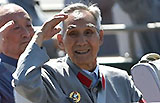Myanmar's election campaign picks up momentum
(Xinhua) Updated: 2015-09-09 16:41The candidates include 5,866 nominated from 92 political parties and 323 independents.
Of the 6,189 candidates, 1,772 are contesting for seats in the House of Representatives (Lower House), 913 for the House of Nationalities (Upper House), 3,341 for region or state parliament and 163 for Region or State Parliament of National Races.
However, 88 candidates have been reportedly disqualified by the commission but rights were offered to them to appeal against the commission's decision. The final figures of approved candidates are yet to be released by the UEC.
Of the political party candidates, the ruling Union Solidarity and Development Party (USDP), led by new chairman U Htay Oo, accounted for 1,134, while the opposition National League for Democracy (NLD), led by Aung San Suu Kyi, nominated 1,151 as preliminarily disclosed.
Following the two major parties, the National Unity Party (NUP) will have the third-highest number of candidates with 763. The NUP is followed by the National Progressive Party (NPP) and the National Democratic Force (NDF) in terms of the number of candidates filed for the election.
Seeking to contest in ethnic minorities constituencies, the Nationalities Brotherhood Federation (NBF), a coalition of 23 ethnic political parties, is sending 710 candidates to contest in the upcoming general election.
Some 32 million eligible voters across the country are expected to cast their votes in 41,000 polling stations across the country on the election day. Nationwide electoral rolls are set to be released on Sept 14.
Meanwhile, international observers are being invited to monitor the election.
The 2015 general election will produce representatives to the next parliament which will take effect from the end of January next year. The presidential run will be on the heels of the parliamentary election by next February, while a new government is not scheduled to take office until late March 2016.
- Myanmar president urges for ceasefire accord
- Chinese bank opens branch in Myanmar
- Myanmar opposition leader terms election as crucial turning point of country
- China and Myanmar focus on border safety
- Photo exhibition on 70th anni. of victory of anti-fascist war launched in Myanmar
- Myanmar to send back 126 more 'boat people' to Bangladesh
- Myanmar's ruling party leader U Shwe Mann removed






